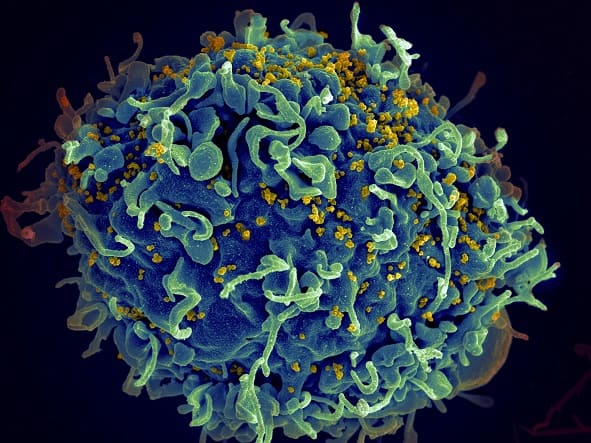
Kymab demonstrates promising research for HIV vaccine development
pharmafile | September 9, 2016 | News story | Medical Communications, Research and Development | HIV, Vaccine, kymab
Cambridge-based antibodies-to-medicines company Kymab has announced publication of research testing the first step in the effort to develop effective vaccines against a range of HIV variants.
The research, supported by the International AIDS Vaccine Initiative and the US National Institutes of Health, showed that Kymouse, a mouse modified to mimic human antibody responses, is an effective platform for discovering and testing possible vaccines and suggest ways in which testing of vaccine candidates can be improved.
“We increasingly recognise that traditional vaccine strategies will not be successful against all viruses, especially not HIV. Together with the Kymab team, we have taken a novel approach in which we have induced human antibodies in Kymouse that are at the beginning of the pathway to protective antibodies and which is a huge boost to our mission to develop a HIV vaccine.” commented Dennis Burton, chair of the TSRI Department of Immunology and Microbial Science and scientific director of the International AIDS Vaccine Initiative (IAVI) Neutralizing Antibody Center (NAC) at TSRI and the National Institutes of Health (NIH) Center for HIV/AIDS Vaccine Immunology and Immunogen Discovery (CHAVI-ID).
A fraction of HIV sufferers develop broadly neutralising antibodies against diverse HIV strains, and such antibodies would be ideal to protect against or possibly treat HIV infection — if a vaccine could be made to elicit them. However, these antibodies originate from a limited number of precursor antibody-producing cells in the body and acquire their unusual and protective properties only during a long course of infection. Moreover, although these cells have been activated when immunising certain biased animal models, this is the first time it has been achieved through immunisation of an immune system that resembles the human.
The researchers injected Kymouse strains with a nanoparticle formed of 60 copies of a small protein that mimics HIV and was designed to bind and stimulate the specific precursor cells for one class of broadly neutralising antibody. They expected to find just one such precursor cell (among tens of millions of such cells) in each immunised mouse.
The research team then looked to see whether or not the mice had mounted an antibody response to this injection. Given the combined challenges of a complex immunogen structure and the rarity of the right antibodies, an effective response against the HIV immunogen was elicited remarkably efficiently. The team validated their antibody response by sequencing genes from more than 10,000 cell samples, and showed that genes from responding mice had the expected sequence for precursors to broadly neutralising antibodies against the HIV target.
“Our phenomenal results with the teams at TSRI and IAVI came from work at the boundaries of protein engineering, immunology and vaccine technology,” explained Professor Allan Bradley, Chief Technical Officer at Kymab and Director Emeritus of the Wellcome Trust Sanger Institute, who developed the Kymouse platform. “Using Kymouse, we show how an advanced vaccine candidate can search out the one cell among tens of million antibody-producing cells and make it proliferate.”
“It is a big step forward in this branch of HIV vaccine development,” added William Schief, TSRI Professor and Director of Vaccine Design for the IAVI Neutralizing Antibody Center at TSRI, in whose lab the vaccine nanoparticle was developed. “We have the first proof of principle that this HIV vaccine strategy and our vaccine candidate can work in a human immune system and trigger the first step in the pathway to developing broadly neutralising and protective antibodies against the virus.”
Kymab has raised over $120m in equity funding from partners including Bill & Melinda Gates Foundation, the Wellcome Trust, Malin Corporation plc and the Woodford Patient Capital Trust plc to fund its unique antibody development platform in therapeutic development and vaccine discovery.
Matt Fellows
Related Content

BioNet receives positive EMA opinion on new pertussis vaccine
BioNet has received a positive opinion from the Committee for Medicinal Products for Human Use …

Recipharm offers manufacturing support to vaccine trial from ImmBIO and iiCON
Recipharm, a contract development and manufacturing organisation (CDMO), has successfully manufactured PnuBioVax, a new protein-based …

European Commission approves HIV prevention injection
The European Commission (EC) has granted marketing authorisation for Gilead Science’s Yeytuo (lenacapavir), the first …






